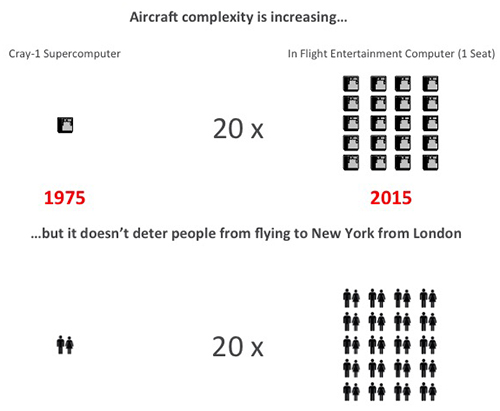From the blog: How many readers of this would travel to New York by boat?
I read with interest Rob Gardner’s Talking Head piece on the need to think differently and work together to solve the problems we face.
One example of how thinking has changed dramatically over the past 50 years is transatlantic travel.
Not long ago the received wisdom was that the only way to travel to New York was by ship, whereas now few would consider going any other way than by plane – and 20 times more people fly to New York from London today than in 1975.
Clearly this switch didn’t happen overnight. We had to think about things differently, get comfortable with ‘new’ ideas and make those ideas more accessible.

Source: River and Mercantile
The challenge with new ideas is that they are often associated with increasing complexity. This is as true in the pensions industry as it is in deciding whether to fly to New York or sail.
The challenge with new ideas is that they are often associated with increasing complexity. This is as true in the pensions industry as it is in deciding whether to fly to New York or sail
When you drill down into the detail a ship, a plane and a pension scheme strategy are all incredibly complex, as is the decision of which to favour.
Complex ideas need simple explanations
I would argue, however, that the challenge is not the complexity of the solution but rather of the explanation.
A plane is not a trivial thing to design and build and, trust me, the maths behind a plane is significantly more challenging than that of derivatives.
However, I would hazard a guess that far fewer people reading this would be happier to use derivatives than get on a plane.
People around the world have grown comfortable with what a plane should look like – two wings, engines and a tail are basic requirements. The airline and type of plane may be other considerations.
There is no right answer, but the point is that governance and decision-making has been made easier for people. The complexity of the vehicle is no longer the problem: explanation and governance of the complexity is.
We should strive to do the same with solving the pensions problem.
Far too often providers will produce pages of complex charts and clever phrases and hope that trustees will buy into the cleverness of the complexity. Equally, trustees may throw out ideas immediately because of the very same complexity.
Trustees should challenge their advisers and managers to explain things in a way that is straightforward. Providers should rise to this challenge and not be afraid to start out simply and help trustees build their knowledge and familiarity with the subject.
Then, together, we may find many more tools at our disposal to help us better address the challenges we face.
In this way the ideas that otherwise seemed as complex and dangerous as flying in the last century may just become accepted practice.
Mark Davies is managing director, derivatives, at River and Mercantile Group

























